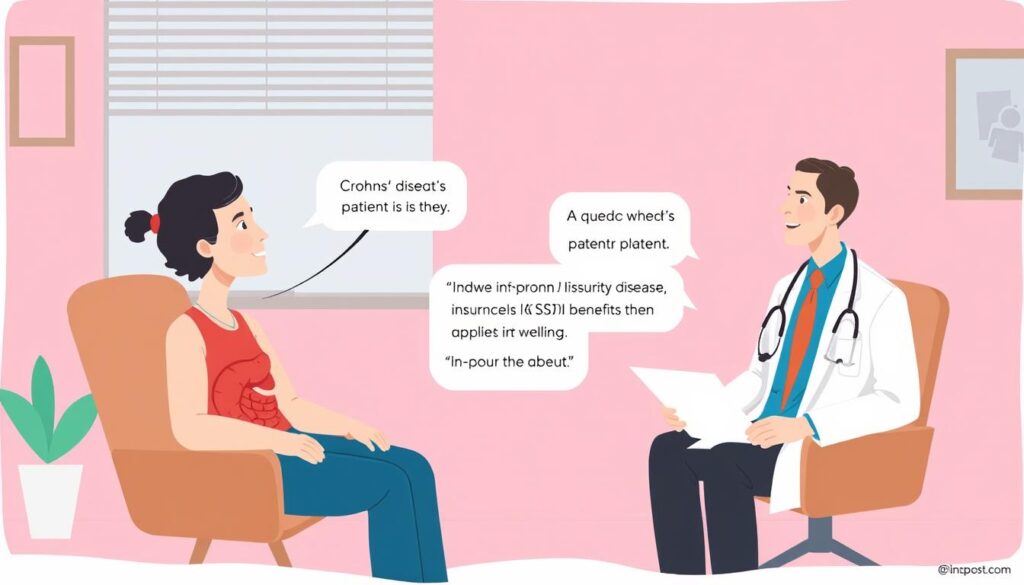Advanced Disability Benefits Estimator
Discover Your Potential Benefits
Are you curious about what disability benefits you might qualify for? Let's find out together!
Crohn’s disease is a chronic condition that causes significant discomfort and inflammation in the gastrointestinal tract, impacting the lives of those affected. Recognized by the Social Security Administration as a disability, Crohn’s disease may qualify individuals for disability benefits if it prevents them from working.

In Nevada, residents suffering from this condition can seek financial assistance through the Disability Insurance program. With 8.9 million people awarded benefits in 2022, and about 126,759 of them having digestive disorders like Crohn’s, understanding the application process is crucial.
This guide will walk you through the steps to claim disability benefits, including the medical criteria and documentation required for a successful application.
Understanding Crohn’s Disease as a Disability
Understanding the impact of Crohn’s disease on daily life is crucial for recognizing it as a disability. Crohn’s disease is a chronic inflammatory bowel disease that can affect any part of the digestive tract, causing severe symptoms that significantly impact daily functioning and the ability to maintain employment.
How Crohn’s Disease Affects Daily Functioning
Crohn’s disease can cause issues anywhere along the GI tract, from the mouth to the anus, commonly affecting the end of the small bowel and the beginning of the colon. Symptoms range from mild to severe and can develop gradually or arise suddenly without warning. The most common symptoms include abdominal pain and cramping, diarrhea, fatigue, and weight loss, making daily activities challenging.
| Symptom | Impact on Daily Functioning | Effect on Employment |
|---|---|---|
| Abdominal Pain and Cramping | Makes everyday activities difficult | Reduces ability to concentrate at work |
| Diarrhea | Causes frequent and urgent bowel movements | Leads to absenteeism or tardiness |
| Fatigue | Results in lack of energy for daily tasks | Impairs productivity and efficiency |
Why Crohn’s Disease Qualifies as a Disability
The Social Security Administration recognizes Crohn’s disease as a qualifying disability because it can prevent individuals from maintaining substantial gainful employment due to its debilitating symptoms. Medical evidence shows that Crohn’s disease often causes systemic complications beyond the digestive tract, including joint pain, skin problems, eye inflammation, and anemia, further supporting its classification as a disability.
Social Security Disability Insurance for Crohn’s Disease
Navigating the complexities of disability benefits for Crohn’s disease requires a clear understanding of the available programs. For individuals living with this chronic condition in Nevada, Social Security Disability Insurance (SSDI) can provide crucial financial support.

SSDI vs. SSI: Which Program Is Right for You?
The Social Security Administration (SSA) offers two main disability programs: SSDI and Supplemental Security Income (SSI). SSDI benefits are available to those who have worked and paid into the Social Security system, while SSI is needs-based and doesn’t require a work history. Understanding the differences between these programs is essential to determine which one you are eligible for.
SSDI eligibility requires having accumulated enough work credits through employment. In contrast, SSI eligibility is based on limited income and resources.
Nevada-Specific Considerations for Disability Benefits
Nevada residents should be aware of state-specific considerations when applying for disability benefits. This includes understanding how Nevada’s healthcare system interacts with federal disability benefits and being aware of local resources available for application assistance.
The average disability check for Crohn’s disease and other digestive system disorders was $1,554.52 per month in 2022. Maximum monthly benefits for SSDI and SSI in 2024 were $3,822 and $943, respectively.
Medical Criteria to Qualify for Disability with Crohn’s Disease
To qualify for disability benefits with Crohn’s disease, understanding the medical criteria set by the Social Security Administration (SSA) is crucial. The SSA has specific requirements that must be met to qualify for disability benefits under Listing 5.06 for inflammatory bowel disease.
SSA’s Definition of Inflammatory Bowel Disease
The SSA defines inflammatory bowel disease (IBD) as a condition that involves inflammation of the gastrointestinal tract, including Crohn’s disease. To meet the SSA’s criteria, your condition must be documented through medical evidence, including endoscopy, biopsy, or imaging studies. The SSA recognizes Crohn’s disease as an impairment under Section 5.06, Inflammatory Bowel Disease.
Specific Qualifying Symptoms and Complications
To qualify for disability benefits, you must demonstrate that your Crohn’s disease meets specific medical criteria. You may qualify if you have experienced intestinal obstruction requiring hospitalization at least twice, 60 days apart, within a six-month period. Alternatively, you can qualify by showing at least two of the following complications: severe anemia, low serum albumin levels, abdominal mass with pain, perineal disease with pain, significant weight loss, or need for supplemental nutrition.
| Complication | Description |
|---|---|
| Severe Anemia | Low red blood cell count causing fatigue and weakness |
| Low Serum Albumin Levels | Indicates malnutrition and inflammation |
| Abdominal Mass with Pain | Presence of a mass in the abdomen accompanied by pain |
| Perineal Disease with Pain | Involvement of the area between the anus and genitals with pain |
| Significant Weight Loss | Unintentional weight loss indicating malabsorption or other complications |
| Need for Supplemental Nutrition | Requirement for additional nutritional support due to malabsorption |
Medical documentation must clearly establish that your Crohn’s disease symptoms persist despite following prescribed treatments and that they significantly limit your ability to perform work activities. Understanding the SSA’s specific definition of inflammatory bowel disease is crucial, as it differs from general medical definitions and requires meeting precise criteria for disability determination.
Financial Requirements for Disability Benefits in Nevada
Understanding the financial requirements for disability benefits is crucial for Nevada residents with Crohn’s disease. To qualify for Social Security Disability Insurance (SSDI) benefits, applicants must meet specific financial criteria.
Work Credits and Employment History Requirements
To be eligible for SSDI benefits in Nevada, applicants must have accumulated sufficient work credits through employment where they paid Social Security taxes. The number of work credits required depends on the applicant’s age when they became disabled. Generally, the Social Security Administration requires that applicants have worked in a job where they paid Social Security taxes long enough and recently enough.
For instance, your work history must show recent employment, typically within the 10 years before becoming disabled from Crohn’s disease. This ensures that your work credits are considered valid for the disability determination process.
Income Limitations and Substantial Gainful Activity
The Social Security Administration enforces strict income limitations through the Substantial Gainful Activity (SGA) threshold. In 2025, the SGA limit is $1,620 per month for non-blind applicants and $2,700 per month for blind applicants. Applicants earning above this threshold are generally not considered disabled.
It’s also crucial for Nevada residents to understand how part-time work and self-employment income affect their eligibility. Even if you’re able to work limited hours despite having Crohn’s disease, your income could impact your disability benefits.
Preparing Your Disability Application
Preparing a disability application for Crohn’s disease requires careful planning and documentation. A well-structured application increases the likelihood of approval by the Social Security Administration.
Essential Medical Documentation for Crohn’s Disease
Gathering comprehensive medical documentation is crucial for Nevada residents applying for disability benefits with Crohn’s disease. This includes diagnostic test results, treatment records, and specialist evaluations.
Essential documents comprise blood tests, fecal occult tests, colonoscopy and endoscopy reports, MRIs, CT scans, and any surgery reports. Records of doctor visits and notes from treating physicians describing limitations are also vital.
| Document Type | Description | Importance |
|---|---|---|
| Blood Tests | Results showing anemia, inflammation levels | High |
| Colonoscopy/Endoscopy Reports | Detailed findings of intestinal examinations | High |
| MRIs/CT Scans | Imaging showing disease extent and complications | High |
| Surgery Reports | Details of surgical interventions for Crohn’s | High |
Completing the Application Forms Correctly
Completing application forms correctly requires careful attention to detail. Accurate reporting of work history, treatment timeline, and specific ways Crohn’s disease symptoms limit work activities is essential.

Statements from gastroenterology specialists carry more weight with the SSA than general practitioner notes. Thus, specialist involvement is critical to the application’s success.
The Disability Application Process in Nevada
Navigating the disability application process in Nevada can be complex, but understanding the steps involved is crucial for success. The Social Security Administration (SSA) provides multiple channels for Nevada residents to apply for disability benefits.
Where and How to Submit Your Application
Nevada residents can submit their disability applications through various methods, including online through the SSA website, by phone, or in person at local SSA offices in cities like Las Vegas and Reno. The SSA allows applicants to choose the method that best suits their needs.
| Application Method | Description | Location/Contact |
|---|---|---|
| Online | Submit application through the SSA website | ssa.gov |
| Phone | Call the SSA to apply over the phone | 1-800-772-1213 |
| In Person | Visit a local SSA office | Las Vegas, Reno, or other Nevada locations |
Timeline and What to Expect After Applying
After submitting the application, the initial processing time typically ranges from 3 to 5 months. During this period, the Nevada Disability Determination Services (DDS) reviews the applicant’s medical evidence and work history. Applicants should be prepared for the possibility of a consultative examination to supplement their existing medical documentation.
The SSA uses a five-step sequential evaluation to determine if the applicant’s Crohn’s disease is severe enough to prevent substantial gainful activity. Understanding that initial denial rates are high for Crohn’s disease claims can help applicants prepare for the potential need to appeal.
What to Do If Your Disability Claim Is Denied
Receiving a denial for your disability claim can be disheartening, especially when you’re struggling with a condition like Crohn’s disease. However, it’s essential to understand that an initial denial is not uncommon, with almost 70% of claims being denied at first.
Understanding Common Reasons for Denial
Claims for Crohn’s disease disability benefits are often denied due to insufficient medical documentation, failure to meet the SSA’s severity threshold, or inadequate proof of work limitations. Understanding these common reasons can help you strengthen your appeal.
The SSA requires detailed medical evidence to support your claim. Ensuring that your application includes comprehensive documentation of your condition, including test results, treatment plans, and how your symptoms affect your daily life and ability to work, is crucial.
The Four Levels of Appeal
If your claim is denied, you have the right to appeal. The Social Security Administration (SSA) provides a four-level appeal process. The first level is Reconsideration, where a different SSA examiner reviews your case, allowing you to submit additional evidence.
If reconsideration is denied, you can request a hearing before an Administrative Law Judge (ALJ), which has the highest approval rate for Crohn’s disease claims, at approximately 50%. You can present testimony about how Crohn’s disease affects your daily life and ability to work, often with the help of medical and vocational experts.
The final two levels of appeal are the Appeals Council and Federal Court review. While these stages require more formal legal arguments and typically benefit from attorney representation, they provide further opportunities to have your claim reviewed.
Working with an Attorney for Your Disability Claim
The process of claiming disability benefits can be daunting, but with an experienced attorney, you can improve your chances of success. If your application for Social Security Disability Insurance (SSDI) or Supplemental Security Income (SSI) benefits is denied, consulting with a disability attorney who specializes in Crohn’s disease claims can be particularly beneficial.
When to Hire a Disability Attorney
Hiring a disability attorney is especially crucial after an initial denial of your claim. Attorneys understand the specific medical criteria and documentation needed for Crohn’s disease cases, significantly improving your chances of approval upon appeal. They work on a contingency fee basis, meaning you pay nothing upfront, and their fees are capped by federal law.
How an Attorney Can Improve Your Chances of Approval
An experienced Social Security disability attorney can gather all necessary medical records, avoiding delays and costly mistakes. They can also obtain targeted opinions from your doctors and prepare you for questioning at hearings. This specialized representation is particularly valuable at the hearing level, where attorneys can effectively argue about your inability to maintain employment due to Crohn’s disease.
| Benefits of Hiring a Disability Attorney | Description |
|---|---|
| Contingency Fee Basis | No upfront costs; attorneys receive 25% of backpay (capped at $7,200) if the case is successful. |
| Specialized Knowledge | Attorneys understand the medical criteria and documentation needed for Crohn’s disease claims. |
| Improved Chances of Approval | Attorneys can gather medical evidence, obtain targeted opinions, and prepare clients for hearings. |
Conclusion
Crohn’s disease can significantly impact one’s quality of life, but Social Security disability benefits can provide financial relief. To qualify for these benefits, Nevada residents must meet specific medical and financial criteria set by the SSA.
Securing disability benefits requires thorough preparation, including comprehensive medical documentation of symptoms such as abdominal pain, weight loss, and anemia. Understanding the application process and potential appeals is also crucial, given the high initial denial rate of around 74% for Crohn’s disease claims.
Working with an experienced disability attorney can significantly improve the chances of approval, especially during the hearing process. Beyond financial benefits, qualifying for disability can also provide access to healthcare coverage, disabled parking, and potential tax benefits, improving overall quality of life.
By understanding the requirements and navigating the application process effectively, individuals with Crohn’s disease can secure the support they need.
